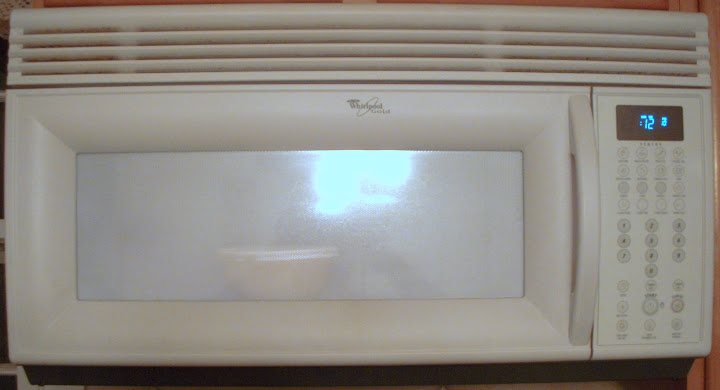OK. So, the first step toward creating a fully functioning dorm kitchen is finding out what your school allows you to have. Most dorms permit microwaves and minifridges. Some campuses allow you to use your own, others supply them in each dorm room/suite, and others still make you rent them from the campus store. So, check out your dorm’s policy on appliances (the information I found was listed in the move-in guide), and if you can buy your own, make sure they meet the requirements listed by your school. No mater what your school’s policy, these things are dead useful, and they are essentials if permitted.
If you’re really lucky, your dorm will allow some other appliances. These include hot-pots, popcorn poppers, coffee pots, blenders, slow cookers, and even, the George Foreman Grill. Hot-pots, which are mainly used to cook rice, and popcorn poppers aren’t really necessary, since both rice and popcorn are easily made in the microwave. The others can be useful, though. A coffee pot is, for you caffeine addicts, useful for making coffee. Less obviously, it can be used to heat any liquid, like canned soup. It is, after all, essentially a hot-plate with a water dispenser. A blender is useful for making last minute breakfasts before dashing out the door to class. Just pop some frozen fruit and yogurt into it, give it a whirl, and voila, instant smoothie. This is what you will probably make in the blender most of the time, but it is useful in some recipes. Slow cookers can make a nice, effort free casserole, but as their name implies, there is a lot of waiting involved. And finally, there’s the George Foreman grill. This will probably be the most useful small appliance in your small kitchen. It is great for grilling chicken, cooking hamburgers, and toasting buns. Definitely worth the investment if it is allowed.
You might also want to look into your school’s policy on knives. A lot of dorms don’t allow them, especially if they’re longer than four inches. That being said, you might want to buy a few extra pairs of scissors (at least one for raw meat and one for everything else). Also, if it is allowed, a mini chopper comes in very handy. A plastic knife will only work for soft things, like apples and pears. (It works for cheese, too, but a cheese grater or a cheese wire is easier, though certainly not necessary).
Well, those are the basics, so get researching.
…until next time!
If you’re really lucky, your dorm will allow some other appliances. These include hot-pots, popcorn poppers, coffee pots, blenders, slow cookers, and even, the George Foreman Grill. Hot-pots, which are mainly used to cook rice, and popcorn poppers aren’t really necessary, since both rice and popcorn are easily made in the microwave. The others can be useful, though. A coffee pot is, for you caffeine addicts, useful for making coffee. Less obviously, it can be used to heat any liquid, like canned soup. It is, after all, essentially a hot-plate with a water dispenser. A blender is useful for making last minute breakfasts before dashing out the door to class. Just pop some frozen fruit and yogurt into it, give it a whirl, and voila, instant smoothie. This is what you will probably make in the blender most of the time, but it is useful in some recipes. Slow cookers can make a nice, effort free casserole, but as their name implies, there is a lot of waiting involved. And finally, there’s the George Foreman grill. This will probably be the most useful small appliance in your small kitchen. It is great for grilling chicken, cooking hamburgers, and toasting buns. Definitely worth the investment if it is allowed.
You might also want to look into your school’s policy on knives. A lot of dorms don’t allow them, especially if they’re longer than four inches. That being said, you might want to buy a few extra pairs of scissors (at least one for raw meat and one for everything else). Also, if it is allowed, a mini chopper comes in very handy. A plastic knife will only work for soft things, like apples and pears. (It works for cheese, too, but a cheese grater or a cheese wire is easier, though certainly not necessary).
Well, those are the basics, so get researching.
…until next time!
Subscribe to:
Posts (Atom)










